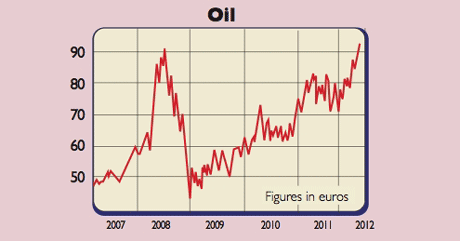Get the latest financial news, insights and expert analysis from our award-winning MoneyWeek team, to help you understand what really matters when it comes to your finances.
You are now subscribed
Your newsletter sign-up was successful
Want to add more newsletters?

Twice daily
MoneyWeek
Get the latest financial news, insights and expert analysis from our award-winning MoneyWeek team, to help you understand what really matters when it comes to your finances.

Four times a week
Look After My Bills
Sign up to our free money-saving newsletter, filled with the latest news and expert advice to help you find the best tips and deals for managing your bills. Start saving today!
It's "dj vu all over again", says Bank of America Merrill Lynch (BAML). Last year, the run-up in oil prices amid the Arab Spring threatened to choke off global growth. This year's oil price surge is another "unambiguous negative".
Oil futures have hit a nine-month high of $126 a barrel, while in euro and sterling terms, black gold is at record peaks of around €94 and £80. The dollar record, set in 2008, is $146. The tight market and the prospect of war between the West and Iran, and the latter's threat to block the Strait of Hormuz, through which a fifth of the world's daily oil supply is shipped, have boosted prices by 17% this year in dollar terms.
The EU has already imposed an oil embargo on Iran. Throw in other disruptions in Nigeria and the Sudan, and the overall threat of supply shocks is the most severe since the Iranian revolution in 1979, reckons Deutsche Bank.
MoneyWeek
Subscribe to MoneyWeek today and get your first six magazine issues absolutely FREE

Sign up to Money Morning
Don't miss the latest investment and personal finances news, market analysis, plus money-saving tips with our free twice-daily newsletter
Don't miss the latest investment and personal finances news, market analysis, plus money-saving tips with our free twice-daily newsletter
As James Hamilton of the University of California in San Diego points out, all but one of the 11 postwar recessions in America were associated with an increase in the price of oil. A key problem is the impact of higher petrol prices on consumers. Four dollars a gallon is a level widely deemed damaging to consumer confidence, and prices have risen to $3.70, a February record. David Rosenberg of Gluskin Sheff notes that consumers have already cut back on energy use at the fastest pace in 15 years.

However, the worst impact of the oil squeeze is likely to be on Europe. BAML says that a $10 increase in the oil price has typically cut growth in consuming nations by 0.1%-0.5%, with the bias towards the lower end of the range in more recent studies as economies have become more energy-efficient. But that sort of dent to growth is enough to tip much of Europe, already in or close to recession, below the zero line.
There is no "magic number" at which oil begins seriously to hurt economies, notes BAML. But the West is hardly in robust shape in any case, as it is weakened by post-credit-bubble deleveraging and an injured banking system. So with little prospect of prices sliding sharply anytime soon, it's a safe bet, as Michael Lewis of Deutsche Bank puts it, that oil is "moving towards the tipping point".
For indepth analysis, read How expensive oil could hit the global economy.
Get the latest financial news, insights and expert analysis from our award-winning MoneyWeek team, to help you understand what really matters when it comes to your finances.
MoneyWeek is written by a team of experienced and award-winning journalists, plus expert columnists. As well as daily digital news and features, MoneyWeek also publishes a weekly magazine, covering investing and personal finance. From share tips, pensions, gold to practical investment tips - we provide a round-up to help you make money and keep it.
-
 Should you buy an active ETF?
Should you buy an active ETF?ETFs are often mischaracterised as passive products, but they can be a convenient way to add active management to your portfolio
-
 Power up your pension before 5 April – easy ways to save before the tax year end
Power up your pension before 5 April – easy ways to save before the tax year endWith the end of the tax year looming, pension savers currently have a window to review and maximise what’s going into their retirement funds – we look at how

